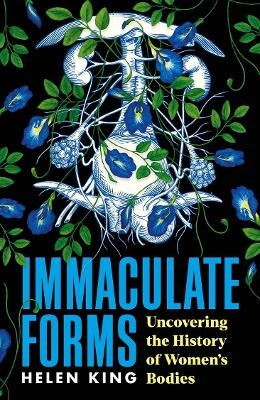
Immaculate Forms
Uncovering the History of Women's Bodies
Seiten
2025
|
Main
Wellcome Collection (Verlag)
978-1-78816-388-0 (ISBN)
Wellcome Collection (Verlag)
978-1-78816-388-0 (ISBN)
- Noch nicht erschienen (ca. Juni 2025)
- Versandkostenfrei innerhalb Deutschlands
- Auch auf Rechnung
- Verfügbarkeit in der Filiale vor Ort prüfen
- Artikel merken
'Delightful, timely and critical' Cat Bohannon
'Expertly weaves science, history and culture to illuminate the most misunderstood parts of our bodies' Dr Jennifer Gunter
Throughout history, religious scholars, medical men and - occasionally - women themselves, have moulded thought on what 'makes' a woman. She has been called the weaker sex, the fairer sex, the purer sex, among many other monikers. Often, she has been defined simply as 'Not A Man'.
Today, we are more aware than ever of the complex relationship between our bodies and our identities. But contrary to what some may believe, what makes a woman is a question that has always been open-ended.
Immaculate Forms examines all the ways in which medicine and religion have played a gatekeeping role over women's organs. It explores how the womb was seen as both the most miraculous organ in the body and as a sewer; uncovers breasts' legacies as maternal or sexual organs - or both; probes the mystery of the disappearing hymen, and asks, did the clitoris need to be discovered at all?
'Expertly weaves science, history and culture to illuminate the most misunderstood parts of our bodies' Dr Jennifer Gunter
Throughout history, religious scholars, medical men and - occasionally - women themselves, have moulded thought on what 'makes' a woman. She has been called the weaker sex, the fairer sex, the purer sex, among many other monikers. Often, she has been defined simply as 'Not A Man'.
Today, we are more aware than ever of the complex relationship between our bodies and our identities. But contrary to what some may believe, what makes a woman is a question that has always been open-ended.
Immaculate Forms examines all the ways in which medicine and religion have played a gatekeeping role over women's organs. It explores how the womb was seen as both the most miraculous organ in the body and as a sewer; uncovers breasts' legacies as maternal or sexual organs - or both; probes the mystery of the disappearing hymen, and asks, did the clitoris need to be discovered at all?
Helen King is a historian of medicine and the body, and has published on aspects of gynaecology and obstetrics from classical Greece to the nineteenth century for over forty years. She is professor emerita of classical studies at The Open University and has held visiting posts at the universities of Vienna, Texas, Notre Dame and British Columbia. She is vice-chair of Together for the Church of England, which campaigns on a range of issues including against discrimination on the grounds of gender or sexuality.
| Erscheint lt. Verlag | 5.6.2025 |
|---|---|
| Zusatzinfo | 100 black and white illustrations8PP section colour |
| Verlagsort | London |
| Sprache | englisch |
| Maße | 129 x 198 mm |
| Themenwelt | Sachbuch/Ratgeber ► Gesundheit / Leben / Psychologie |
| Geschichte ► Teilgebiete der Geschichte ► Kulturgeschichte | |
| Studium ► Querschnittsbereiche ► Geschichte / Ethik der Medizin | |
| Sozialwissenschaften ► Politik / Verwaltung ► Politische Theorie | |
| Sozialwissenschaften ► Soziologie | |
| ISBN-10 | 1-78816-388-5 / 1788163885 |
| ISBN-13 | 978-1-78816-388-0 / 9781788163880 |
| Zustand | Neuware |
| Informationen gemäß Produktsicherheitsverordnung (GPSR) | |
| Haben Sie eine Frage zum Produkt? |
Mehr entdecken
aus dem Bereich
aus dem Bereich
der stille Abschied vom bäuerlichen Leben in Deutschland
Buch | Hardcover (2023)
C.H.Beck (Verlag)
23,00 €
vom Mittelalter bis zur Gegenwart
Buch | Softcover (2024)
C.H.Beck (Verlag)
12,00 €


